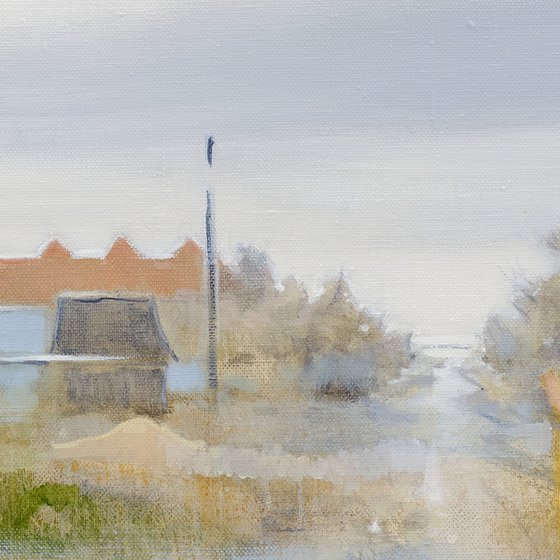- Alexander Levich
- All Artworks
- Blues for Blue Bus
Blues for Blue Bus (2020)Oil painting by Alexander Levich
200 x 120 x 2cm (unframed)
£4,751.77
Original artwork description
Alexander Levich’s Blues for Blue Bus (2020, oil on canvas, 120x200 cm) is a contemplative large-format work that explores the forgotten edges of the built environment. The canvas depicts an abandoned light-blue minibus left on a muddy roadside, its body slowly rusting as weeds climb around it. A scattering of small houses recedes into the background, and the overcast sky adds to the subdued tone.
Levich often uses travel and its interruptions as metaphors in his work. Here, the bus serves as a striking emblem of journeys that have ended, of vehicles once full of movement now silent and immobile. The contrast between the faded blue of the bus and the earthy tones of its surroundings creates both harmony and tension, underscoring the emotional pull of the scene.
The painting is figurative, direct, and evocative. For many viewers, it recalls places they have seen but rarely stopped to consider – patches of landscape where time feels suspended. Levich’s sensitivity to mood ensures that the work resonates beyond its subject, becoming not just a record of abandonment but a poetic reflection on memory, place, and the quiet persistence of life at the margins.
Materials used:
Oil
Details:
- Oil painting on Canvas
- One of a kind artwork
- Size: 200 x 120 x 2cm (unframed)
- Signed on the front
- Style: Impressionistic
- Subject: Landscapes, sea and sky
Tags:
#large canvas#figurative painting#quiet mood#outskirts town#forgotten road#abandoned vehicle#blue bus#memory landscape#rust weeds#melancholic scene14 day money back guaranteeLearn more
Original artwork description
Alexander Levich’s Blues for Blue Bus (2020, oil on canvas, 120x200 cm) is a contemplative large-format work that explores the forgotten edges of the built environment. The canvas depicts an abandoned light-blue minibus left on a muddy roadside, its body slowly rusting as weeds climb around it. A scattering of small houses recedes into the background, and the overcast sky adds to the subdued tone.
Levich often uses travel and its interruptions as metaphors in his work. Here, the bus serves as a striking emblem of journeys that have ended, of vehicles once full of movement now silent and immobile. The contrast between the faded blue of the bus and the earthy tones of its surroundings creates both harmony and tension, underscoring the emotional pull of the scene.
The painting is figurative, direct, and evocative. For many viewers, it recalls places they have seen but rarely stopped to consider – patches of landscape where time feels suspended. Levich’s sensitivity to mood ensures that the work resonates beyond its subject, becoming not just a record of abandonment but a poetic reflection on memory, place, and the quiet persistence of life at the margins.
Materials used:
Oil
Details:
- Oil painting on Canvas
- One of a kind artwork
- Size: 200 x 120 x 2cm (unframed)
- Signed on the front
- Style: Impressionistic
- Subject: Landscapes, sea and sky
Tags:
#large canvas#figurative painting#quiet mood#outskirts town#forgotten road#abandoned vehicle#blue bus#memory landscape#rust weeds#melancholic scene






